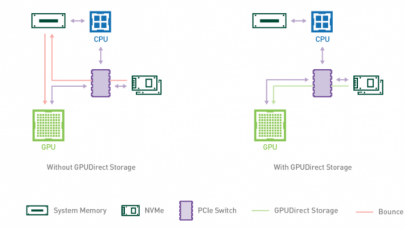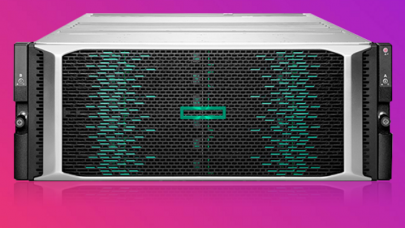


Inside AWS’s Plans to Make S3 Faster and Better
As far as big data storage goes, Amazon S3 has won the war. Even among storage vendors whose initials are not A.W.S., S3 is the defacto standard for storing lots of data. But AWS isn’t resting …

Object Storage a ‘Total Cop Out,’ Hammerspace CEO Says. ‘You All Got Duped’
The mass adoption of object storage systems like Amazon S3 may appear to be a top achievement of the big data era, since we got essentially unlimited storage accessible through REST commands. But …

HPCwire’s 2024 People to Watch
Find out which 12 HPC luminaries are being recognized this year for driving innovation within their particular fields.

MLPerf Releases Latest Inference Results and New Storage Benchmark
September 13, 2023
MLCommons this week issued the results of its latest MLPerf Inference (v3.1) benchmark exercise. Nvidia was again the top performing accelerator, but Intel (Xeo Read more…

Direct IO Performance Using Nvidia GPUDirect Storage
August 2, 2023
The focus on GPU processing speeds makes sense. The massive uplift in processing has been important in many areas including HPC and now Generative AI with LLM ( Read more…

The Grand Challenge of Simulating Nuclear Fusion: An Overview with UKAEA’s Rob Akers
May 25, 2023
As HPC and AI continue to rapidly advance, the alluring vision of nuclear fusion and its endless zero-carbon, low-radioactivity energy is the sparkle in many a Read more…

HPE Taps VAST Data For Fast File Storage on GreenLake
April 4, 2023
HPE today rolled out its first file storage offering for GreenLake, its everything-as-a-service offering. The new HPE GreenLake for File Storage offering pairs Read more…

Pegasus ‘Big Memory’ Supercomputer Now Deployed at the University of Tsukuba
March 25, 2023
In the bevy of news from Nvidia's GPU Technology Conference this week, another new system has come to light: Pegasus, which entered operations at the University Read more…

Finland’s CSC to Host ‘Massive’ Data Lake for Destination Earth
March 13, 2023
CSC, Finland’s scientific IT center, is now most famous for its LUMI system, launched in partnership with EuroHPC and landing third on the most recent Top500 Read more…

Intel Officially Launches Sapphire Rapids and HPC-optimized Max Series
January 10, 2023
After a number of delays, Intel has launched its fourth-generation Intel Xeon Scalable processor, codenamed Sapphire Rapids, the successor to Ice Lake. Manufact Read more…

Hyperion Paints a Positive Picture of the HPC Market
November 8, 2022
Return to normalcy is too strong, but the latest portrait of the HPC market presented by Hyperion Research yesterday is a positive one. Total 2022 HPC revenue ( Read more…

- Click Here for More Headlines

Whitepaper
Why IT Must Have an Influential Role in Strategic Decisions About Sustainability
In this era, expansion in digital infrastructure capacity is inevitable. Parallel to this, climate change consciousness is also rising, making sustainability a mandatory part of the organization’s functioning. As computing workloads such as AI and HPC continue to surge, so does the energy consumption, posing environmental woes. IT departments within organizations have a crucial role in combating this challenge. They can significantly drive sustainable practices by influencing newer technologies and process adoption that aid in mitigating the effects of climate change.
While buying more sustainable IT solutions is an option, partnering with IT solutions providers, such and Lenovo and Intel, who are committed to sustainability and aiding customers in executing sustainability strategies is likely to be more impactful.
Learn how Lenovo and Intel, through their partnership, are strongly positioned to address this need with their innovations driving energy efficiency and environmental stewardship.
Download Now
Sponsored by Lenovo
Whitepaper
How Direct Liquid Cooling Improves Data Center Energy Efficiency
Data centers are experiencing increasing power consumption, space constraints and cooling demands due to the unprecedented computing power required by today’s chips and servers. HVAC cooling systems consume approximately 40% of a data center’s electricity. These systems traditionally use air conditioning, air handling and fans to cool the data center facility and IT equipment, ultimately resulting in high energy consumption and high carbon emissions. Data centers are moving to direct liquid cooled (DLC) systems to improve cooling efficiency thus lowering their PUE, operating expenses (OPEX) and carbon footprint.
This paper describes how CoolIT Systems (CoolIT) meets the need for improved energy efficiency in data centers and includes case studies that show how CoolIT’s DLC solutions improve energy efficiency, increase rack density, lower OPEX, and enable sustainability programs. CoolIT is the global market and innovation leader in scalable DLC solutions for the world’s most demanding computing environments. CoolIT’s end-to-end solutions meet the rising demand in cooling and the rising demand for energy efficiency.
Download Now
Sponsored by CoolIT
Advanced Scale Career Development & Workforce Enhancement Center
Featured Advanced Scale Jobs:
HPCwire Resource Library
HPCwire Product Showcase
© 2024 HPCwire. All Rights Reserved. A Tabor Communications Publication
HPCwire is a registered trademark of Tabor Communications, Inc. Use of this site is governed by our Terms of Use and Privacy Policy.
Reproduction in whole or in part in any form or medium without express written permission of Tabor Communications, Inc. is prohibited.
































